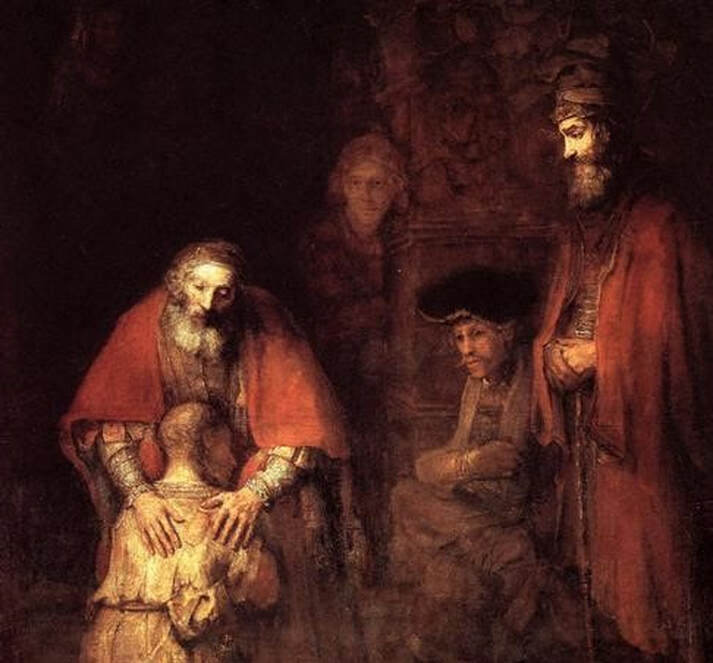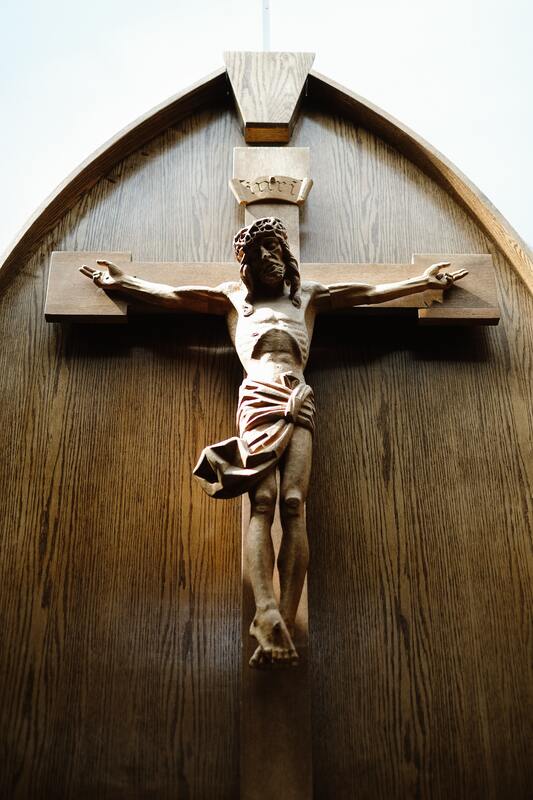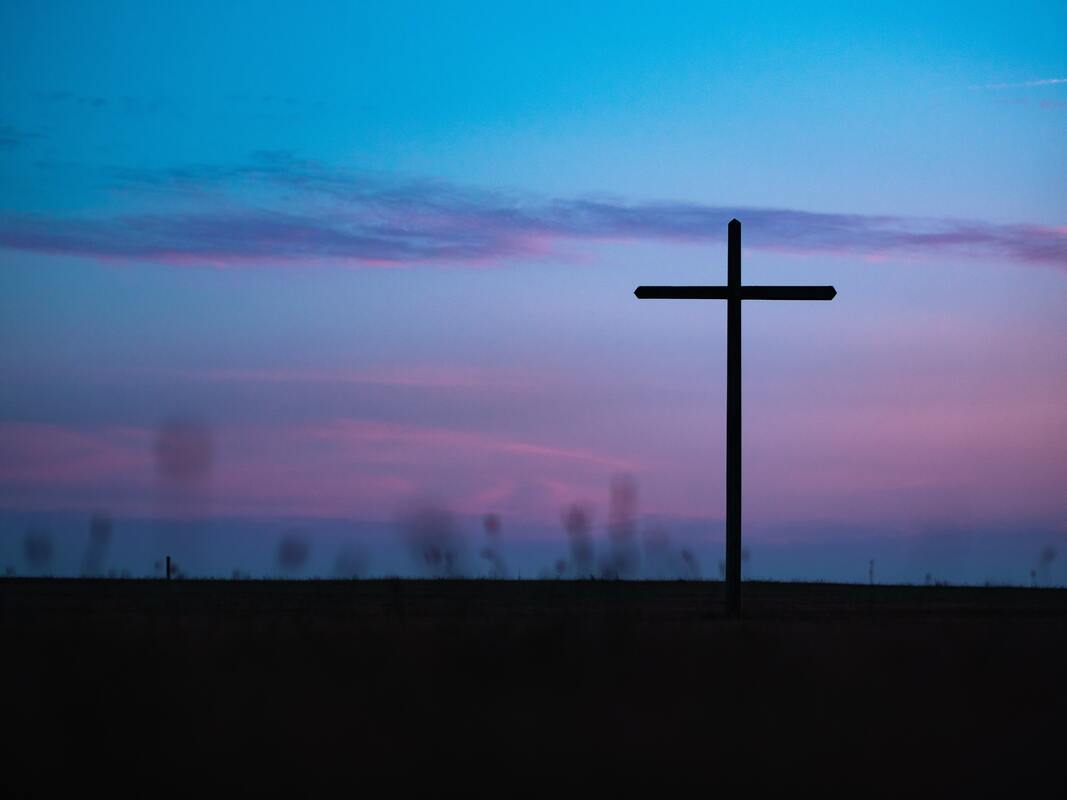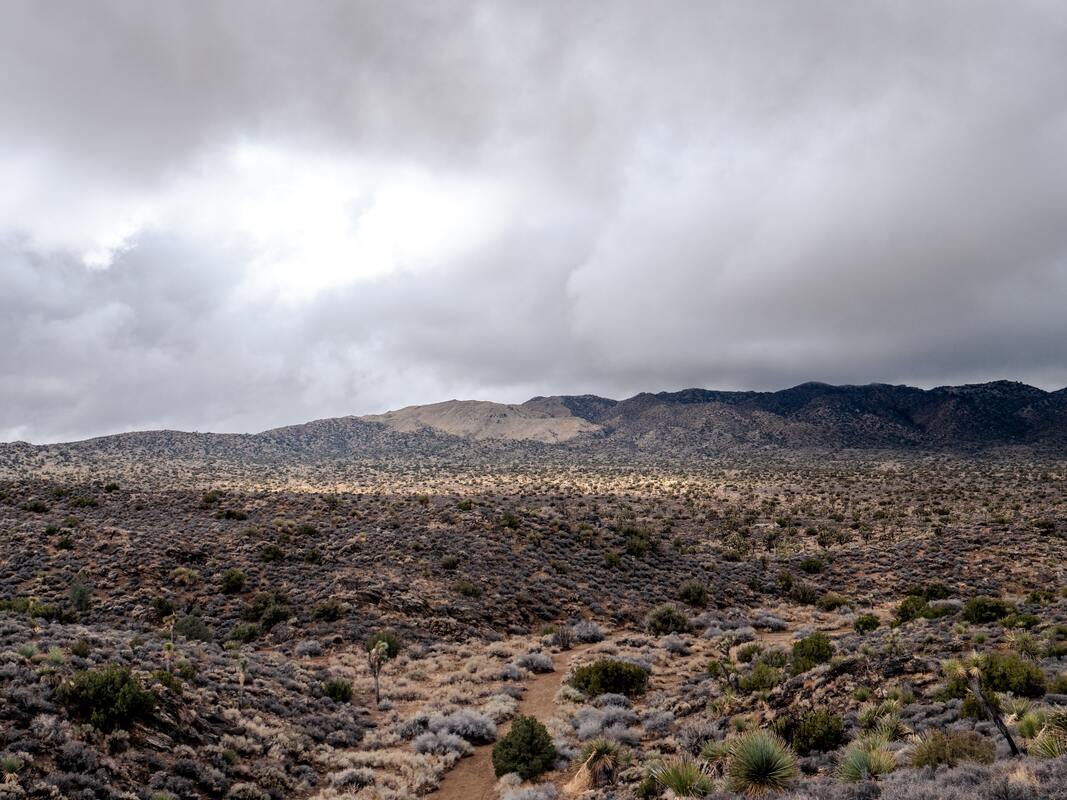|
Scripture Readings: Joshua 5:9–12 | Psalm 32 | 2 Corinthians 5:16–21 | Luke 15:1–3, 11b–32
“If anyone is in Christ, there is a new creation: everything old has passed away; see, everything has become new!” (2 Corinthians 5:17) Our Gospel reading today recounts a well-known, and well-beloved parable… a powerful story offering surprising comfort and hope… good news for all who have wandered, and lost themselves… a window into the heart of God’s abundant saving grace, which calls us all to be transformed by His New Creation. Before we dig in to this parable and try to discern it’s message for us this morning, perhaps we should take a step back and remember it’s place in Luke’s wider story. For the last few chapters in Luke’s Gospel, Jesus has been hard at work revealing the character of God’s good Kingdom. He has been teaching with many parables, short stories and punchy word-pictures that often have the effect of shaking up the expectations of those listening. He has also been more directly confronting the beliefs and practices of many regarding what it really means to be faithful to the LORD… about what it means to be aligned and in sync with what the Living God is up to in the world. Luke tells us today that many were moved by what Jesus was saying and doing, but that not everyone appreciated what they were hearing… or seeing. Luke 15:1-2 says “Now all the tax collectors and sinners were coming near to listen to him. And the Pharisees and the scribes were grumbling and saying, ‘This fellow welcomes sinners and eats with them.’” If Jesus claims to be sent from God, and to walk in God’s holy ways, they grumbled, then how could He stand to spend time and share meals with those kind of people? Before we look down on the Pharisees and scribes, let’s not ignore our own easy prejudices… our own tendencies to avoid the ‘wrong kind of people’, whoever that may be. Who are the ones that we would find hard to welcome and to share a meal with? Who do we find it hard to imagine taking part in God’s Kingdom? In answer to the complaints of the Pharisees and scribes, Jesus tells three parables: about a Lost Sheep, a Lost Coin, and a Lost Son… or rather, Lost Sons. All three of these parables speak of the surprising and saving love of God, but the longest, the story of the Lost Sons, ups the ante, and drives home the point… and a challenge. First off, we hear about the shameful story of the younger son, who insults his father’s honour, wastes every penny of his inheritance by chasing after his own desires, and is left destitute in a foreign land… having lost everything… not only money, but friendship, dignity, and hope. He has no one who cares for him. He’s burned every single bridge. But in his lowest moment, he remembers his father, and how his father had treated his servants with kindness. Of course, it was out of the question to be welcomed back into the family after all he had done… but maybe his father would have pity enough to hire him? Maybe? So the youngest son returns, planning to sell himself to survive. But Jesus paints for us a picture of welcome no one would have anticipated. At the first sight of his shameful, ruined son, the father is filled with compassion and races toward the wretch, welcoming him home with a warm embrace and throwing a joy-filled feast in celebration. The scholar Roger Van Harn unpacks the significance of the father’s welcome, and what it meant for the young man’s future: “What follows are the signs of restoration. The best robe was the father’s robe. The signet ring was a sign of restored authority and responsibility. The shoes were a sign that he was indeed a son, not a servant. The killing of the fatted calf was a sign that the whole community was invited to celebrate the restoration of the relationship. The unexpected, extravagant display of grace in restoring his son is accounted for by the father’s own words: ‘Let us eat and celebrate; for this son of mine was dead and is alive again; he was lost and is found!’”[1] The younger son had indeed brought shame and dishonour on his family, and lost everything… but what mattered most to the father was that this wayward son had returned. That they were reunited, reconciled. That new life could begin. What a beautiful picture of grace, forgiveness, and abundant, generous love… offering comfort and hope to all of us who have made a mess of our lives. This story is a glimpse into the gracious love of the Living God, who above all longs for His wayward children to return to Him and find new life in His arms… but the story’s not over. Let’s turn now to the story of the eldest son. Unlike his shameful brother, the elder son had done his duty. He had been loyal and diligent, setting aside his own desires to serve his father… anticipating the day he would be rewarded for his faithfulness, unlike that reprobate brother of his, who was thankfully gone for good. But then the lost younger son returns… and the oldest hears that he has been welcomed home with a feast, and fully restored into the family. The elder son is incensed at the thought of welcoming home this ‘son of his father’ he can’t bring himself to call brother…. and so he refuses to join in the party. He cuts himself off from the joy of his father, and stands at a distance, grumbling. Again, the father does the unexpected: he goes out in search of his other lost son, and pleads with him to come home from the fields and join in the joyful celebration. Far from an expression of favoritism, the father loves both of his sons, and longs for them both to be reunited in his love: “Son, you are always with me, and all that is mine is yours. But we had to celebrate and rejoice, because this brother of yours was dead and has come to life; he was lost and has been found.’” (Luke 15:31-32). Then Jesus ends the story with the elder son’s response left hanging, leaving his listeners to wonder ‘How will he respond to the father’s invitation?’ Will he hold onto his resentment and bitterness, and refuse to welcome home this sinner who has finally returned? Or will he relent and follow his father back to the house and join in the celebration, reunited and ready to share in a new life together? Of course, this story was told to invite others to choose how they too would respond. How were the Pharisees and scribes to respond to the surprisingly gracious welcome that Jesus was offering to tax collectors, outcasts, sinners, and all the ‘wrong’ sorts of people, who had drawn near to Jesus, seeking from Him the New Life of God’s Kingdom? Perhaps more to the point: How will you and I respond? How will our lives either reject or embody this gracious, abundant love of God Jesus offers… love that does not shy from welcoming sinners, and sharing all that we have with them? The love that longs for all of us to be restored and reconciled? This parable offers us all an invitation to rejoice in the gracious, rescuing love of the Living God, not only as it bears fruit in our own lives, but in all those who will draw near to Jesus and seek out New Life in Him? It is calling us not just to acknowledge this love from a safe distance, grumbling with our arms crossed, but rather to actively share in the New Life of Jesus Christ… extending His welcome… inviting others with our words and our actions to draw near to in Him in faith, and come to His table… where we are all offered the forgiveness, mercy, and reconciliation. The joyful celebration of sinners returning home, rescued by God’s truly faithful Son who let Himself be lost on the cross so that we all might be found… who died for us, so that we might live, reunited to our Father forever. Who rose again from the grave, so that we might know that in Jesus Christ the risen Lord, God has begun His New Creation… transforming us even today… not the least by transforming the way we see and treat those all around us. St. Paul spoke of this in his letter to the Christians in the city of Corinth. In 2 Corinthians 5:14-19 he writes: “For the love of Christ urges us on, because we are convinced that one has died for all; therefore all have died. And he died for all, so that those who live might live no longer for themselves, but for him who died and was raised for them. From now on, therefore, we regard no one from a human point of view; even though we once knew Christ from a human point of view, we know him no longer in that way. So if anyone is in Christ, there is a new creation: everything old has passed away; see, everything has become new! All this is from God, who reconciled us to himself through Christ, and has given us the ministry of reconciliation; that is, in Christ God was reconciling the world to himself, not counting their trespasses against them, and entrusting the message of reconciliation to us.” Christ came to seek and to save the lost… and to rescue us all through offering His life once and for all… to transform us by His saving love, not just into better people… like the elder brother seemed at first, compared to the younger son… but to reunite us to the very heart of the Father… to reconcile us all to the Living God, and fill us with His Holy Spirit, so that we can live reconciled together as the beginning of God’s New Creation. So now, remembering that in Christ Jesus God has welcomed us all, and bids us join in the joyful celebration and the New Life of His Kingdom, how can we respond today to His forgiveness, grace and abundant, saving love? How can we let go of the prejudices, and grudges that threaten to keep us apart? And how can we help those around us drawn near to Jesus, and share in His New Creation too? Amen. [1] Roger E. Van Harn, “Fourth Sunday in Lent, Year C,” in The Lectionary Commentary: Theological Exegesis for Sunday’s Texts, Volume Three, ed. Roger E. Van Harn (Grand Rapids, MI: Eerdmans, 2001), 409–410.
0 Comments
We are journeying together through Lent, a sacred season of prayer, repentance, fasting, reflection, generosity, and preparation for Holy Week. Each year, Lent calls us to remember and return to the basics of our faith: our calling to lives of holy love, our deep need for forgiveness and grace, and above all the salvation of God in Jesus Christ the Lord. Here is the fourth video in a series from the Bible Project exploring the Shema, a passage of Scripture at the heart of both the Jewish and Christian faith: "Hear, Israel! The Lord is our God, the Lord is one! And you shall love the Lord your God with all your heart and with all your soul and with all your strength." (Deuteronomy 6:4-5, NASB) Our service of Morning Prayer, Bulletin, and Sermon this week can be found here: And our Songs this week can be found here: Seek the Lord while he may be found, call upon him while he is near; let the wicked forsake their way, and the unrighteous their thoughts; let them return to the Lord, that he may have mercy on them, and to our God, for he will abundantly pardon. (Isaiah 55:6-7)
Our Gospel reading today is not an easy one to be sure. In it, Christ presents us with a challenging message to hear, to comprehend, and to respond to. We’re told Jesus hears about a recent catastrophe: some Galilean pilgrims were slain by Pilate, the Roman governor, while they had come to the Temple to worship God. This leads Him to make some surprising remarks: “Do you think that because these Galileans suffered in this way they were worse sinners than all other Galileans? No, I tell you; but unless you repent, you will all perish as they did.” He then says the same thing about those killed in Jerusalem when a tower collapsed: “do you think that they were worse offenders than all the others living in Jerusalem? No, I tell you; but unless you repent, you will all perish just as they did.” Now one thing is obvious about this passage: it is a clear summons to repent… to turn away from our selfishness and sins, and to turn towards the Living God. But wrapped up with this clear invitation to repent comes some nagging questions and concerns about how these two tragedies, and many others besides them, connect to our choices and actions. In other words, we might find ourselves asking today: is Jesus saying that those people simply got what they deserved? And that unless we repent and fix ourselves up, we’ll get what we deserve too? Is this how we are supposed to think about the tragedies in our own lives? The sudden catastrophes that we and others find ourselves facing? What about the people of Mariupol, in Southeastern Ukraine? All those civilians besieged and bombarded by the Russian military? As heartbreaking as it is, are they just getting what was coming to them? Sadly, sometimes even our fellow brothers and sisters in Christ have made these kinds of claims… trying to find some logic amid all the tragic and terrible events in our world. Sometimes it seems easier to try and draw a direct line between the evil that someone experiences and the evil that they somehow “must have” embraced. This point of view is summed up in the sentiment: “we all get what we deserve.” So, when our life starts to fall apart by a frightening diagnosis… or by a betrayal, or an accident… the age-old questions come to mind: ‘Why me?’ ‘What did I do to deserve this?’ Or ‘what did those people we love and care for who are suffering… why did this have to happen to them?’ These questions come quite naturally. But as natural and urgent as these kinds of questions can be, our Gospel reading today is not about drawing a direct line between all suffering and sin… such that we can look around at human misery and somehow explain it all away. Rather, Christ is instead offering us a warning… one that all of us must heed… but it is a warning that springs from the heart of the infinite mercy and steadfast love of God. Just like us, the people in Jesus’ day wanted to understand the causes of catastrophes… they shared our impulse to try and explain what seems like random or unjust tragedies, and one common way was, just like Job’s friends, to try and find fault with the victims. ‘This must have been God’s judgement on them…’ ‘They must have done something horrible for that kind of thing to happen.’ ‘They must be getting what they deserve.’ Psychologically speaking, this kind of reasoning is often a strategy of self-preservation…. an attempt to assure ourselves that something like that couldn’t happen to us. Or at least to help us feel a more bit secure in a world where we often feel powerless. As long as we play by the rules, and keep our nose clean, this line of thought likes to assure us, then we won’t have to worry about those kind of tragedies. The problem, of course, is that this clearly isn’t true. And it also leads to a dangerous kind of presumption… the attitude that somehow we are secure in our moral superiority. If sin leads directly to suffering, then I can look down on those in misery. After all, they’re only getting what they deserve, right? This is the attitude, the presumption that Jesus forcefully attacks in our reading today, undermining the false sense of security this viewpoint fosters: ‘You think those folks were worse sinners than the rest of you? Forget it! Don’t assume you’re any better… turn around and put your trust in God!’ The scholar Marguerite Shuster has this to say regarding our reading: “Most emphatically—a point that cannot possibly be overemphasized—we have no justification for using a text like this one to free ourselves from anxiety about the fate of other people on the grounds that they are, after all, getting no more than they deserve. That would be to turn on its head what Jesus is doing here. What he is doing, though, is not very pleasant: he is telling those who are not at the moment suffering that they should not rest secure in their immediate comfort, for that comfort is not a sign of their positive moral deserts… Instead of resting secure, one should take grateful advantage of time given to repent, for it may be cut short at any moment.”[1] Jesus is not offering an argument for why those tragedies had happened at all. Instead of a why… He gives offers a what… a clear and urgent call to action. He’s warning us not to trust in our own self-righteous security… and instead calls us to turn to the LORD with all of our heart, and strength, and mind… and to do so NOW, without delay! It's not about how to avoid suffering, it’s a call to live faithfully every day… no matter what comes our way. A call to place our trust in the Living God, and stay true to our Saviour. This is the same concern we heard in St. Paul’s letter to the Corinthian Christians this morning, urging them to beware the dangers of spiritual presumption… of assuming we’re standing securely on solid ground when we are not. He offers up the example of the Israelites when they were rescued from slavery in Egypt… after they had already been saved by God, and were on the way to the Promised Land. Yet Paul reminds us, because of Israel’s persistent unfaithfulness, they kept on turning their backs to God their Saviour, and brought about all sorts of suffering on themselves as a result. They kept on choosing the roads that only led to death, when God had already done so much to spare them, to provide for and guide them… to bring them a whole New Life. In light of their less than ideal example, St. Paul doesn’t want Christians to assume that because we’ve been baptized, or share in the other sacraments, or have experienced God’s salvation in the past, that we can now just live however we want to. Of course, all these things (Baptism, Holy Communion, powerful experiences of God’s saving grace) are wonderful gifts of God meant to draw us deeper into His fellowship and life, they are not guarantees that we can assume set us free to chase after our own desires. We cannot assume that because we are Christians how we live each day doesn’t matter: “if you think you are standing,” St. Paul warns us, “watch out that you do not fall.” But along with that warning, St. Paul points us again to the grace and mercy of God: “No testing has overtaken you that is not common to everyone. God is faithful, and he will not let you be tested beyond your strength, but with the testing he will also provide the way out so that you may be able to endure it. (1 Corinthians 10:12-13). Turn to the LORD and trust in Him, Paul says, even in the midst of our trials, knowing that He longs to be our gracious and faithful Saviour. Not giving us simply what we deserve, but abundantly more than we could ask or imagine! This is what we heard from the LORD through the Prophet Isaiah in our first reading today: an invitation to share in the abundant generosity of God’s salvation. Isaiah 55:1-3. “Ho, everyone who thirsts, come to the waters; and you that have no money, come, buy and eat! Come, buy wine and milk without money and without price. Why do you spend your money for that which is not bread, and your labor for that which does not satisfy? Listen carefully to me, and eat what is good, and delight yourselves in rich food. Incline your ear, and come to me; listen, so that you may live.” Everyone who thirsts, come… you that have no money, come, buy and eat… without money, and without price. No talk at all of what we deserve. The scholar Timothy Saleska highlights the nature of this gracious invitation… this undeserved gift of God to all who turn to Him: “This banquet of salvation, this feast of victory, is not exclusive but inclusive! For all of us who are burdened by life’s failed expectations, by our own inadequacies, and by our sin, God says, “Come and eat!” For us who are afraid of death and who often feel as if we are slaves to circumstances beyond our control, God says, “Come and eat!” For everyone who is thirsty, here is water. To all of us who have no money—nothing to give—Yahweh still says, “Come and eat!” …This is indeed precious food. Not only do verses 1 and 2 invite all those who have nothing and have no means of their own, but in effect it says: “Your money is no good here anyway.” “Come, buy wine and milk without money and without means of exchange.” That doesn’t only say, “those who have nothing can still eat,” but also that the meal is not available for money anyway. No one can offer anything to get it because it is priceless—it has no price and is beyond price!”[2] Friends, God offers us not what we deserve… He gives us abundantly more! More mercy. More forgiveness. More fellowship. More meaning and hope, and joy. More peace, even in the midst of chaos and catastrophes. More comfort, even as we grieve. More life… even in in the very shadow of death. And nowhere is the abundant grace of God more lavishly given than in the catastrophe of the cross; where the terrible cost of the sins of the world was bourn by the only One who did nothing at all to deserve it. Where Jesus Christ, gave His body to be broken to put our wicked and wayward world back together… and gave His precious blood to wash all of our sins away. This is the same Jesus who warns us to turn our hearts today and every day to the Living God. To seek Him, to listen to His voice, and entrust our lives to His saving love, receiving His gift of New Life that Jesus paid for at the cross… and inviting others to join us in turning to Him with all our hearts. I’ll end now with a few more words from Timothy Saleska: “In the end, Yahweh serves up Christ for us. In him we find compassion and pardon and eternal life. In him God keeps the covenant he made with David, and we receive the mercies of his eternal kingdom. He feeds our hungry souls and fills us with good things, all at no cost to us (remember, the feast is priceless) but of course at great cost to him. And so, in Christ the meal is ready. He brings us the precious gifts of forgiveness and eternal life. And he wants us to come. As the text says, “Seek him while he allows himself to be found… Call him while he is near!” The meal is ready now. Now is the time of salvation. In his word and the proclamation of it and in his supper in which he offers his very body and blood, the God of pardon and peace and eternal life is to be found. In Christ, the work of the servant is freely offered. Come and eat!”[3] Amen. [1] Marguerite Shuster, “Third Sunday in Lent, Year C,” in The Lectionary Commentary: Theological Exegesis for Sunday’s Texts, Volume Three, ed. Roger E. Van Harn (Grand Rapids, MI: Eerdmans, 2001), 392. [2] Timothy E. Saleska, “Third Sunday in Lent, Year C,” in The Lectionary Commentary: Theological Exegesis for Sunday’s Texts, Volume One (Grand Rapids, MI: Eerdmans, 2001), 365. [3] Timothy E. Saleska, “Third Sunday in Lent, Year C,” in The Lectionary Commentary: Theological Exegesis for Sunday’s Texts, Volume One (Grand Rapids, MI: Eerdmans, 2001), 366–367. We are journeying together through Lent, a sacred season of prayer, repentance, fasting, reflection, generosity, and preparation for Holy Week. Each year, Lent calls us to remember and return to the basics of our faith: our calling to lives of holy love, our deep need for forgiveness and grace, and above all the salvation of God in Jesus Christ the Lord. Here is the third video in a series from the Bible Project exploring the Shema, a passage of Scripture at the heart of both the Jewish and Christian faith: "Hear, Israel! The Lord is our God, the Lord is one! And you shall love the Lord your God with all your heart and with all your soul and with all your strength." (Deuteronomy 6:4-5, NASB). Our service of Morning Prayer, Bulletin, and Sermon this week can be found here: And our Songs this week can be found here: We are journeying together through Lent, a sacred season of prayer, repentance, fasting, reflection, generosity, and preparation for Holy Week. Each year, Lent calls us to remember and return to the basics of our faith: our calling to lives of holy love, our deep need for forgiveness and grace, and above all the salvation of God in Jesus Christ the Lord. Here is the second video in a series from the Bible Project exploring the Shema, a passage of Scripture at the heart of both the Jewish and Christian faith: "Hear, Israel! The Lord is our God, the Lord is one! And you shall love the Lord your God with all your heart and with all your soul and with all your strength." (Deuteronomy 6:4-5, NASB). Rev. Rob is away this Sunday, so in the place of a sermon this week we invite you to take a moment of prayerful reflection after the Gospel reading, listening for the word of the Lord this day in the Scriptures and the liturgy. Our service of Morning Prayer & Bulletin this week can be found here: And our Songs this week can be found here: Scripture Readings: Deuteronomy 26:1–11 | Psalm 91:1–2, 9–16 | Romans 10:8–13 | Luke 4:1–13
“For there is no distinction between Jew and Greek; the same Lord is Lord of all and is generous to all who call on him. For, ‘Everyone who calls on the name of the Lord shall be saved.’” (Romans 10:12-13) Today marks our first Sunday in the sacred season of Lent: a season of intentional prayer and reflection, of fasting, repentance, generosity, and turning wholeheartedly to the Living God as we head towards Holy Week… the yearly commemoration of what Christ Jesus accomplished for us all at the cross. This season calls us to refocus, to re-centre ourselves on the truth of the Gospel… something I know that I need these days, with all that’s been going on in our world. But rather than pull us away from the concerns and struggles that we, and our wider world, are experiencing, Lent offers us a way to face them faithfully. Our Scripture readings today remind us that at the core of our faith is the conviction that when we call out to the Living God, our Saviour hears. In our passage this morning from the book of Deuteronomy, we’re told of an interesting tradition that the Israelites were to put into practice. Looking ahead to a time when Israel would no longer be wandering in the wilderness, but would finally be settled within the Promised Land, the LORD calls them to celebrate: to bring an offering from their very first harvest in the land and present it to the LORD… and recount the story of their salvation. Deuteronomy 26:4-10. “When the priest takes the basket from your hand and sets it down before the altar of the Lord your God, you shall make this response before the Lord your God: “A wandering Aramean was my ancestor; he went down into Egypt and lived there as an alien, few in number, and there he became a great nation, mighty and populous. When the Egyptians treated us harshly and afflicted us, by imposing hard labor on us, we cried to the Lord, the God of our ancestors; the Lord heard our voice and saw our affliction, our toil, and our oppression. The Lord brought us out of Egypt with a mighty hand and an outstretched arm, with a terrifying display of power, and with signs and wonders; and he brought us into this place and gave us this land, a land flowing with milk and honey. So now I bring the first of the fruit of the ground that you, O Lord, have given me.” “…we cried to the Lord, the God of our ancestors; the Lord heard our voice and saw our affliction, our toil, and our oppression.” This statement stands at the centre of the story of Israel. In their lowest moment, the LORD heard their cry, and came to their rescue. He had compassion on them, and came against Egypt with supreme power, authority, and glory, delivering Israel in ways they would never have dreamed possible. They were to recount this story, reminding themselves of the source of their blessings and new life, and offer their gifts to the LORD… not as a way to manipulate Him, or to somehow gain His favour… but as a joyful and grateful response for what God had already done. They had cried out to God, and He saved them. This was something they were never meant to forget. But time and again, they did… turning away from their Saviour, and chasing after their own desires. This leads us to our Gospel passage for today, and the story of Jesus being led by the Holy Spirit into the wilderness, where after praying and fasting for forty days, He is tempted three times by the devil. This part of Christ’s story is meant to call to mind the part of Israel’s story when God had saved them from slavery in Egypt, and then led them into the wilderness… to learn to trust and follow Him on the way to the Promised Land. Sadly, instead of trusting the LORD to provide and guide His chosen people, they constantly grumbled, rebelled, and refused to place their faith in the One who had rescued them. Fast forward now to Jesus, and we find Him replaying that journey, but this time God’s Chosen One is determined not to repeat His ancestors’ failures. He is dedicated to fulfilling His mission to restore the broken relationship between the Living God and His unfaithful people. But Christ is not alone in the desert. We’re told the tempter, the devil has plans of his own to derail Christ’s mission, and disrupt His vital connection to His Heavenly Father. These temptations are all aimed to call into question Christ’s core identity… to shake the foundation of His faithfulness, and cut Him off from the LORD. “If you are the Son of God,” the devil begins, “command this stone to become a loaf of bread.” (Luke 4:3). Use your heavenly power to satisfy your own needs and desires. Next, the devil shows Jesus all of the kingdoms of the earth: “To you I will give their glory and all this authority; for it has been given over to me, and I give it to anyone I please. If you, then, will worship me, it will all be yours. (Luke 4:6-7). You don’t need to serve someone else. Bend you knee to me, and you’ll get to call all the shots! And finally, the devil takes Jesus to the pinnacle of the Temple in Jerusalem, and quotes Scripture to Him: “If you are the Son of God, throw yourself down from here, for it is written, ‘He will command his angels concerning you, to protect you,’ and ‘On their hands they will bear you up, so that you will not dash your foot against a stone.’” (Luke 4:9-11) There’s a deep warning for all of us here: most of the worst lies are truths that have been twisted. So much of the turmoil and destruction we see in our world today is fueled by people taking something true, and distorting it… deliberately, or even unintentionally, and turning it into a tool of the devil… undermining the work of God’s kingdom, paralyzing His people… or even worse yet, drawing us into the service of hatred, pride, selfishness, vanity greed, and fear. How often have we heard of our fellow Christians caught up in these destructive lies? We have all seen so much damage being done in the name of Christ. Then again, how often have we too fallen prey to the enemy’s deceptions? How often have we been the ones who have failed to be faithful? Of course, Lent teaches us that the response God wants s not for us to wallow in shame, but to turn from the lies to the truth, and in so doing to be set free. It’s ironic that the very same passage that the devil quoted, Psalm 91, goes on to speak of his own demise, and how it will come about. In Scripture, the devil is spoken of both as a raging lion, and the crafty serpent… and Psalm 91:13-16 gives us this wonderful hope: “You shall tread upon the lion and adder; you shall trample the young lion and the serpent under your feet. Because he is bound to me in love, therefore will I deliver him; I will protect him, because he knows my name. He shall call upon me, and I will answer him; I am with him in trouble; I will rescue him and bring him to honour. With long life will I satisfy him, and show him my salvation.” The Chosen One, the Messiah, the Christ, was sent to overcome the enemy, not independently, but through the rescuing love of the LORD. “I will protect him…” God says, “He shall call upon me, and I will answer him; I am with him in trouble; I will rescue him and bring him to honour.” The enemy tried to erode the bond of love between God’s Son and His Heavenly Father, but Jesus instead chose to trust and to stay true. He chose to refuse to seize the power to satisfy His own hunger, and instead Jesus gives up His life to offer the Bread of Heaven to all. He chose to refrain from exalting Himself and grasping after kingdoms and authority, and instead Jesus humbled Himself, taking on the role of the servant of all. He rejected the chance to glorify Himself with self-centred spectacles, drawing people to adore Him in vanity and pride. Instead, Jesus embraced the way of the cross… revealing the glory of God’s holy love by dying to set sinners free. And three days later, the Living God revealed His promised salvation: raising Jesus up to eternal power, authority, glory, and life, and opening up the way through Jesus for all to share in His salvation. This is precisely where St. Paul the Apostle directs our attention in our reading today from his letter to the Christians in Rome. Far from a formula for how to ensure our own salvation, St. Paul is reminding us of the saving work the Triune God, Father, Son, and Holy Spirit, has already accomplished for us all through the death and resurrection of Jesus Christ. “[I]f you confess with your lips that Jesus is Lord and believe in your heart that God raised him from the dead, you will be saved.” This is the Good News of what God has done for us! Like the Israelites looking back with thankfulness and joy at what the LORD had done for them, we too are called to remember the mighty things that God has done in sending Jesus to be our Saviour, placing our faith firmly in Him. But more than a mere memory, this faith invites us to keep calling on the LORD. To continue to trust in Him to be our Saviour day by day, shaping all that we say and do. To believe that in Jesus Christ, we too will share in God’s ultimate victory over the enemy, and eternal life bound to Him in holy love. In Jesus Christ, we can call upon the Living God confident that He will answer. That He will be with us in our trouble. That He will rescue us. That in Him we will find abundant, and unending life, and will see God’s eternal salvation. And that this gift is not just meant for us, but for all. “For there is no distinction between Jew and Greek; the same Lord is Lord of all and is generous to all who call on him. For, “Everyone who calls on the name of the Lord shall be saved.” Let us remember that this does not mean that we will be spared from all sorrow and suffering. After all, the New Life Christ offers us also calls us to pick up our cross and follow Him into the way of faithfulness even in the face of trials, hope in the midst of despair, and longsuffering love even for those who truly hate us. The way of life, even in the valley of the shadow of death. But in Jesus, God has revealed that His power is made perfect in weakness… that despite the nations’ raging, His kingdom and authority will never come to an end, and that His eternal glory awaits all who call on His name. No matter what troubles we find ourselves facing, or what lies are tempting us to give in or give up, in Jesus we will see God’s salvation... for His is the Kingdom, the power, and the glory, forever and ever. Amen. Along with Christians around the world, we have begun our journey through Lent, a sacred season of prayer, repentance, fasting, reflection, generosity, and preparation for Holy Week. Each year, Lent calls us to remember and return to the basics of our faith: our calling to lives of holy love, our deep need for forgiveness and grace, and above all the salvation of God in Jesus Christ the Lord. Here is the first video in a series from the Bible Project exploring the Shema, a passage of Scripture at the heart of both the Jewish and Christian faith: "Hear, Israel! The Lord is our God, the Lord is one! And you shall love the Lord your God with all your heart and with all your soul and with all your strength." (Deuteronomy 6:4-5, NASB). Our service of Morning Prayer, Bulletin, and Sermon this week can be found here: And our Songs this week can be found here: As we begin the sacred season of Lent, a time of repentance, prayer, and preparation for Holy Week, Ash Wednesday calls us to remember not simply our mortality... the fragility and fractured nature of our lives and our world, but also to remember the abundant mercy of the Living God, who in Jesus Christ "welcomes sinners and invites them to His table."
For those of us unable to join us in person for our Ash Wednesday service at St. Luke's this year, here is an At-Home Ash Wednesday order of service. (Note: There is no Imposition of Ashes rite in this particular At-Home service.) Many blessings in the name of Jesus Christ, our Saviour and Redeemer. Rob+ |
Rev. RObRev. Rob serves as the Priest-in-Charge at St. Luke's Gondola Point, and as the School Chaplain at Rothesay Netherwood School Archives
June 2024
Categories
All
|
|
5 Quispamsis Road, Quispamsis NB, E2E 1M2
Mail to: 12 Quispamsis Road, Quispamsis NB E2E 1M2 |
Contact Us
Parish Phone: 506-847-3670 | www.stlukesgp.ca | www.facebook.com/StLukesGP/ Rev. Rob: 506-608-1772 | [email protected] |
Proudly powered by Weebly









 RSS Feed
RSS Feed
